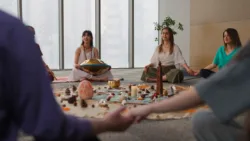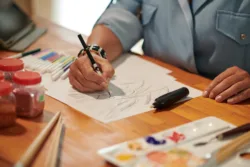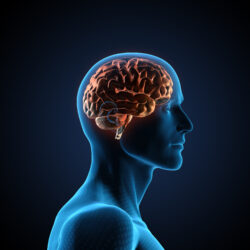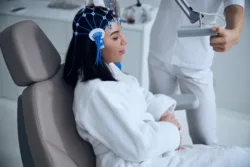What Will My Teen Learn in Mental Health Treatment?

Perhaps you’ve found yourself in a similar situation: your teen is about to start mental health treatment, and you’re wondering what they – and you – have signed up for. Your teen probably has several questions (even if he or she doesn’t voice them out loud), which have triggered or doubled your own questioning about mental health treatment.
Wondering about therapy and other forms of treatment is completely normal. After all, most people only have a single phone call with the provider before services actually start, which mostly covers logistics like insurance and appointment times. Then what? What will my child share? What will they talk about for a whole session? How will I know if progress is being made? And maybe the biggest question: What actually happens in therapy?
These thoughts and others plague parents when children first begin mental health treatment. Although there are many forms of treatment which will greatly differ based on your child’s needs and severity of mental illness, there are some things you can generally expect your teen to learn in the process of treatment.
Emotional recognition and expression
One of the most common issues for young people dealing with mental health challenges is learning to notice and express emotions. Emotional knowledge is crucial for self-awareness and social awareness, and is typically a skill that comes with age, but sometimes needs extra attention.
Teaching teens to name their own emotions, notice physiological signs of emotions and advocate for themselves based on needs arising from emotions are all common baseline lessons that are a starting point in counseling. When this teaching is successful, teens should be able to recognize beginning signs of anger to curb aggressive behavior, self-advocate when anxiety becomes overwhelming and express feelings of depression to an adult.
Coping skills
Another popular component of teen mental health treatment is learning how to cope with strong emotions. These tools are often called “coping skills” or “coping strategies” and are practical actions that people can take to handle uncomfortable feelings. Having emotional recognition skills is the foundation for this because different emotions require different self-soothing techniques.
Coping skills can be good or bad. For example, a teen may take up smoking as a method to cope with depression. Bad coping skills cannot just be nixed; they must be replaced. The teen who has taken up smoking could replace the habit with taking walks or aromatherapy.
Other popular coping skills you teen might try in mental health treatment: deep breathing exercises, stretching, drawing, listening to music, using a fidget (like a stress ball), reading, journaling, going for a run or taking a break in a calm space.
Self-care
Where coping skills are designed as strategies to deal with feelings of stress, anger and depression, self-care and mindfulness practices are aimed at decreasing the likelihood of those feelings arising. For example, a teen who meditates every morning as a self-care practice may prevent feelings of anxiety during class, and therefore require fewer or less frequent coping strategies at school. Basically, self-care is a preventative measure.
Self-care practices are not responses to feelings, and should be calming or enjoyable activities. Exercising, eating well, spending time with friends, engaging in hobbies and taking time to rest are all ways to practice self-care. These skills are focused on overall health and will teach kids about their own mind-body connection.
Structure
Teen mental health treatment, whether in a residential facility or a once-a-week session with a counselor, is bound to deliver a sense of routine. The content of individual sessions may be more client-directed (where the conversation follows the client’s lead), but the organization and overall flow will follow a distinct path that aligns with the teen’s treatment plan. Moreover, any inpatient or outpatient mental health treatment will have a specific program, almost like a school curriculum, that is individualized and modified for each person.
This focus on structure decreases stress because it allows for predictability in treatment. It minimizes anxiety and gives teens something to rely on when the rest of their life may feel chaotic. Structure in treatment offers the best rates of success, and is implemented with the intention of being carried over into the teen’s life. More order in treatment can increase order in lifestyle and in mind.
Medication
Learning about medication may or may not be part of your teen’s treatment regimen; if it is, you can be assured that psychoeducation on the benefits, effects and dangers of medication will also be given. Learning to identify and express feelings again comes into play as teens will learn how to be their own advocate when finding or changing medications.
Another teen mental health treatment benefit is information on medication management, which is the regular taking of prescriptions according to a doctor’s orders.
There are dozens of overall benefits to teen mental health treatment, from growth in self-confidence to managing self-destructive behaviors. Each child will require different skills, but the ones mentioned above offer insight into the foundational skills that most mental health treatment programs will cover.
If you think your teen needs intervention to address emotional awareness, coping skills, self-care, structure and help with medication, reach out to High Focus Centers PA. High Focus Centers PA provides services to teens and adults to address mental health issues, when you call (610) 644-6464.
In This Blog...
Related Posts

Experiential Therapy: Healing Through Action at High Focus Centers PA

Unlocking Healing Through Creativity: The Power of Expressive Arts Therapy in Outpatient Treatment

Healing the Brain in Addiction Recovery: The Key to Lasting Change

Revolutionizing Mental Health Treatment in Pennsylvania: The Promise of TMS at High Focus Centers




